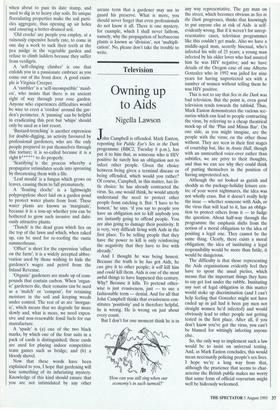Television
Owning up to Aids
Nigella Lawson
John Campbell is offended. Mark Easton, reporting for Public Eye's Sex in the Dark programme (BBC2, Tuesday 8 p.m.), has put it to him that, as someone who is HIV positive he surely has an obligation not to infect other people. Given the choice between being given a terminal disease or being offended, which would you rather? Of course, Campbell, in this matter, has lit- tle choice: he has already contracted the virus. So, one would think, he would utterly understand the need to protect other people from catching it. But: 'I have to be honest,' he says. 'if you say to people you have an obligation not to kill anybody you are instantly going to offend people. You are also going to damage their positivity. It is very, very difficult living with Aids in the first place. To be telling people that they have the power to kill is only reinforcing the negativity that they have to live with already.'
And I thought he was being honest. Because the truth is he has got Aids, he can give it to other people; it will kill him and could kill them. Aids is one of the most awful things to have happened this century. Why? Because it kills. To pretend other- wise is just evasiveness, just — to use a fashionable term — denial. And for all that John Campbell thinks that evasiveness con- stitutes 'positivity' and is therefore helpful, he is wrong. He is wrong on just about every count.
But I don't for one moment think he is in 'How can you still sing when our economy's in such turmoil?' any way representative. The gay man on the street, which becomes obvious as Sex in the Dark progresses, thinks that knowingly to put anyone else at risk of Aids is self- evidently wrong. But if it weren't for unrep- resentative cases, television programmes like this couldn't get made. Also we have a middle-aged man, secretly bisexual, who's infected his wife of 25 years; a young man infected by his older lover who had assured him he was HIV negative; and we have details of the Oregon case of one Alberto Gonzalez who in 1992 was jailed for nine years for having unprotected sex with a number of women without telling them he was HIV positive.
This is not to say that Sex in the Dark was bad television. But the point is, even good television tends towards the tabloid. Thus, Mark Easton demonstrates the various sce- narios which can lead to people contracting the virus, by referring to a cheap theatrical mock-up of the 'Plus and Minus Bar'. On one side, as you might imagine, are the people with the virus; on the other those without. They are seen in their first stages of courtship but, like in Annie Hall, though with an unmouthed voice-over rather than subtitles, we are privy to their thoughts, and thus we can see why they could think of putting themselves in the position of having unprotected sex.
Although the set looked as garish and shoddy as the package-holiday leisure cen- tre of your worst nightmares, the idea was not wholly crass. But it doesn't really help the issue — whether someone with Aids, or the virus that will lead to it, has an obliga- tion to protect others from it — to fudge the question. About half-way through the programme the emphasis shifts from the notion of a moral obligation to the idea of positing a legal one. They cannot be the same thing. Clearly, there exists a moral obligation; the idea of instituting a legal responsibility would be more than futile, it would be dangerous.
The difficulty is that those representing the Aids organisations evidently feel they have to spout the usual pieties, which means that the important things they have to say get lost under the rubble. Instituting any sort of legal obligation in this matter would stoke up discrimination (and I can't help feeling that Gonzalez might not have ended up in jail had it been gay men not straight women he'd infected) and would obviously lead to other people not getting tested in the first place. After all, if you don't know you've got the virus, you can't be blamed for wittingly infecting anyone else.
So, the only way to implement such a law would be to insist on universal testing.
And, as Mark Easton concludes, this would mean necessarily policing people's sex lives. I hope we're a long way from that, although the prurience that seems to char- acterise the British public makes me worry that some form of official voyeurism might well be hideously welcomed.


















































 Previous page
Previous page